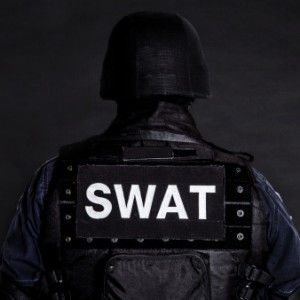Results 1 to 1 of 1
Thread Information
Users Browsing this Thread
There are currently 1 users browsing this thread. (0 members and 1 guests)
-
08-14-2014, 05:01 AM #1Senior Member


- Join Date
- May 2007
- Location
- South West Florida (Behind friendly lines but still in Occupied Territory)
- Posts
- 117,696
Officials: It’s ‘Objectively Reasonable’ For Cops To Terrorize Innocent Civilians
Officials: It’s ‘Objectively Reasonable’ For Cops To Terrorize Innocent Civilians
August 14, 2014 by Sam Rolley
 THINKSTOCK
THINKSTOCK
A lawsuit filed by an Illinois resident who was the victim of a botched SWAT raid is being challenged by local authorities on the grounds that it is “objectively reasonable” for law enforcement officials to carry out potentially deadly operations based on faulty intelligence.
On June 21, 2012, police in Evansville, Ill., shattered the glass door of 68-year-old Louise Milan’s home, tossed in flash grenades and stormed the residence, terrorizing the elderly woman and her 18-year-old adopted daughter.
“The officers smashed Milan’s window and storm door and threw in two flash-bang grenades that created property damage in addition to the destroyed window and storm door. The officers used flash-bang grenades despite the fact that [there] were no threatening suspects visible,” the lawsuit says. “Milan and her daughter were ordered on to the floor at gunpoint, handcuffed and paraded in front of their neighbors into police vehicles. Both were detained and questioned by the officers.”
The heavy -handed raid was carried out after officers obtained a warrant to apprehend a person they believed made terroristic online threats targeting their department from the home. Unfortunately, the police failed to realize that the threats had been made by a criminal taking advantage of Milan’s unsecured Wi-Fi router.
The person who made the threats, suspected gang leader Derrick Murray, actually lived in his mother’s nearby house . Murray later admitted to using his smartphone to access Milan’s router, which was not protected by a password, and making the threats.
The failures in intelligence gathering notwithstanding, in defense of Milan’s lawsuit alleging Constitutional abuses related to their ill-informed raid ( an emotionally charged show of force) the cops say their actions aren’t subject to judgment.The Evansville Courier and Press explains why:The case is an important one for anyone who wishes to see more accountability in American law enforcement. Sadly, it isn’t likely to result in an outcome that will slow the threat of America’s increasingly militarized police.
City attorneys Keith Vonderahe and Robert Burkart argued in the motion that police are protected by the legal principle of qualified immunity. In it, the U.S. Supreme Court has ruled that “government officials performing discretionary functions generally are shielded from liability for civil damages” as long as their conduct does not “clearly” violate established “statutory or constitutional rights.”
http://personalliberty.com/officials...ent-civilians/Join our efforts to Secure America's Borders and End Illegal Immigration by Joining ALIPAC's E-Mail Alerts network (CLICK HERE)
Similar Threads
-
EXCLUSIVE: INNOCENT MAN SUES AFTER COPS BEAT HIM & PEPPER-SPRAY THE WOUNDS
By Newmexican in forum Other Topics News and IssuesReplies: 0Last Post: 12-09-2013, 01:58 PM -
It begins in Florida: Military Cops Arrest Civilians in Flor
By AirborneSapper7 in forum Other Topics News and IssuesReplies: 0Last Post: 07-29-2011, 07:57 AM -
Miss. Cops Taser Innocent Lawn Party
By AirborneSapper7 in forum Other Topics News and IssuesReplies: 0Last Post: 07-09-2011, 04:48 AM -
M3 REPORT: Mexican Army mistakenly kills innocent civilians
By SicNTiredInSoCal in forum illegal immigration News Stories & ReportsReplies: 0Last Post: 09-08-2010, 03:21 PM -
Drug gangs drive off cops, terrorize Mexican town
By JohnDoe2 in forum illegal immigration News Stories & ReportsReplies: 0Last Post: 02-17-2009, 05:44 PM


 LinkBack URL
LinkBack URL About LinkBacks
About LinkBacks




 Reply With Quote
Reply With Quote


Congressman Eli Crane says Biden administration is stonewalling...
04-24-2024, 05:07 AM in illegal immigration News Stories & Reports